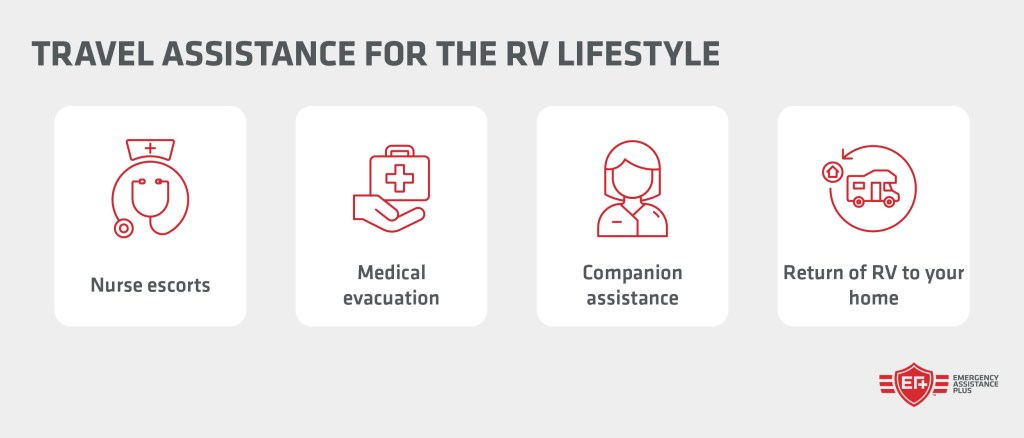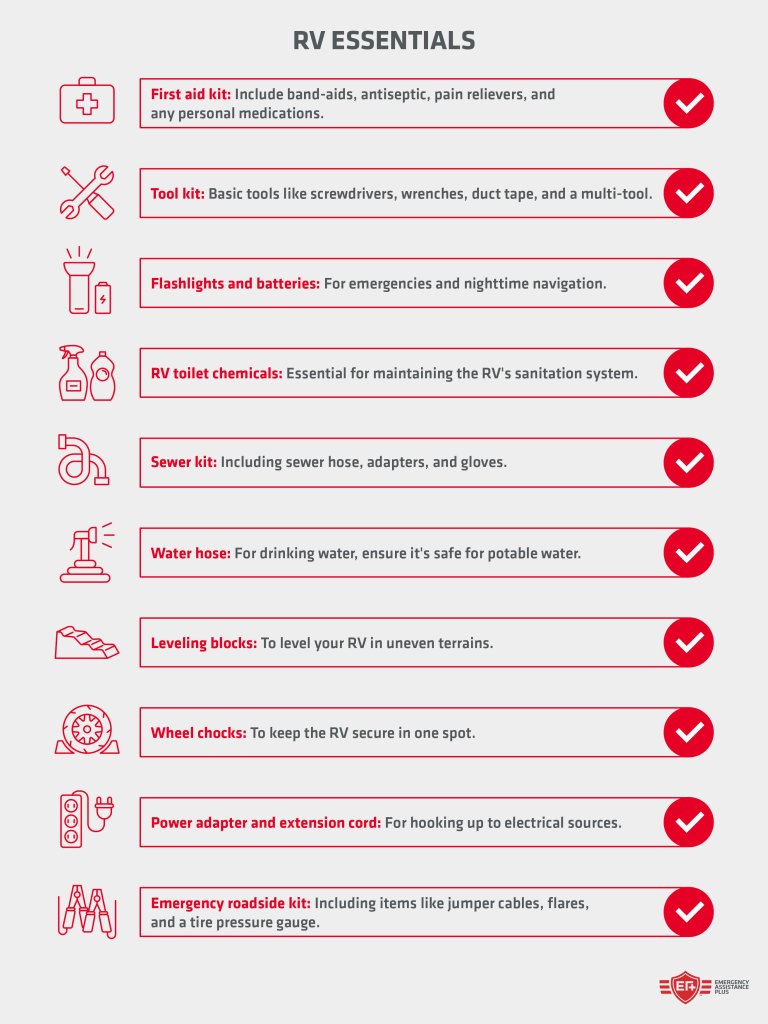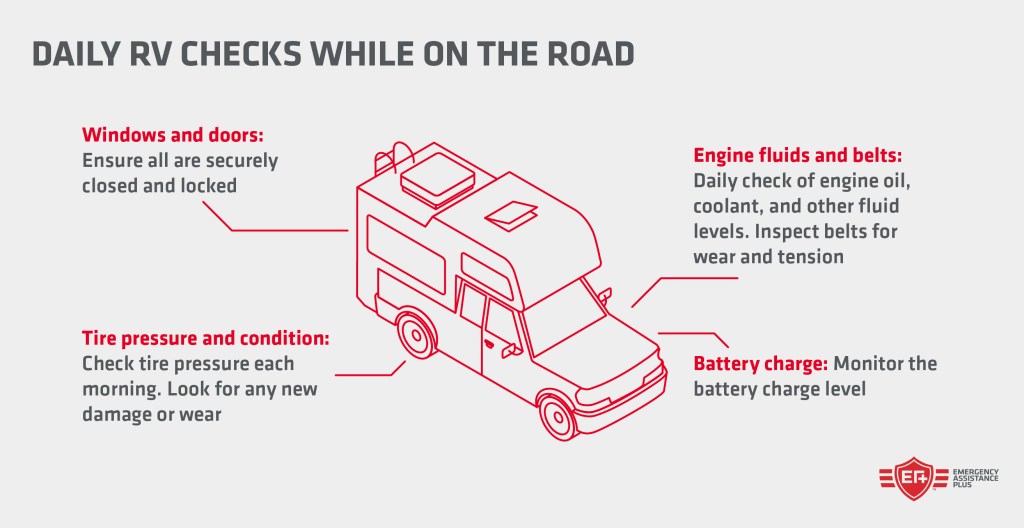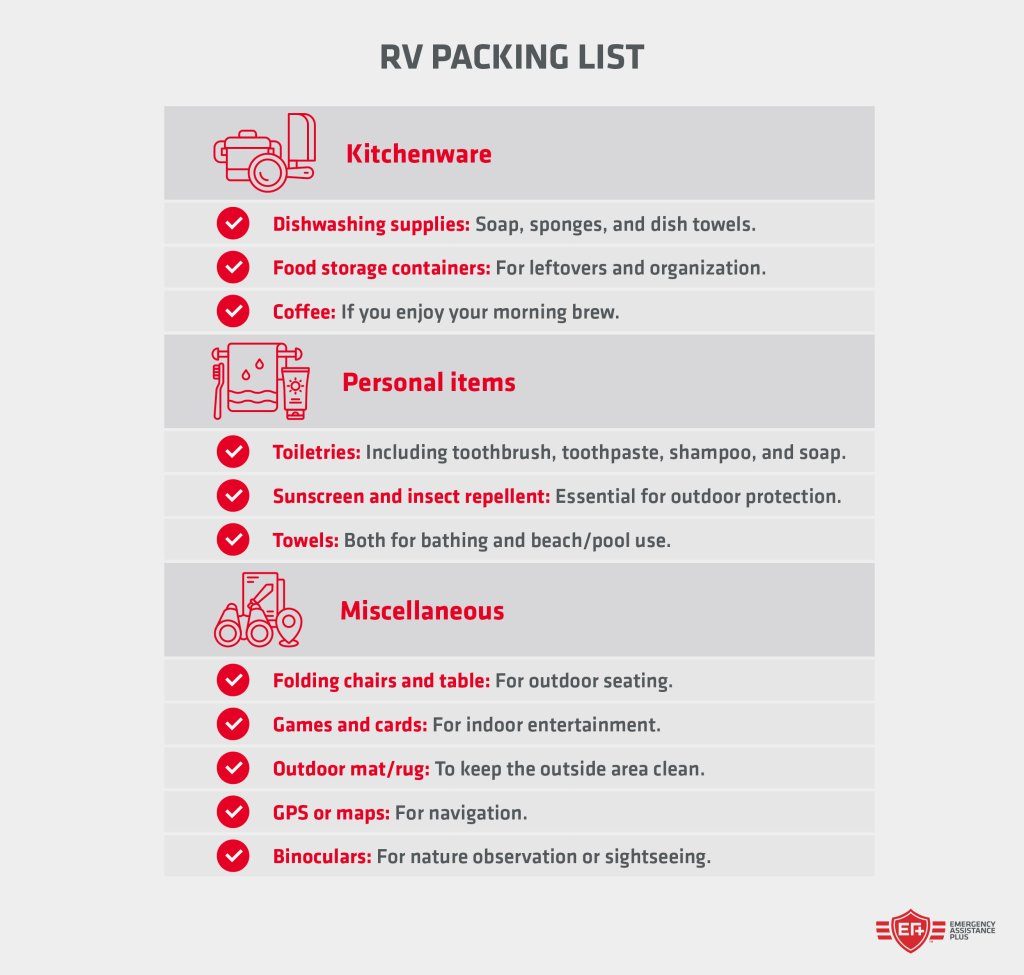Hit the road in style (and safety!) with these RV tips and tricks.
Published on January 18th, 2024 in Road Trip, Travel Tips
The RV industry is booming!
11.2 million U.S. households now own an RV (RVIA), and that means there are a lot of new RVers out there. In fact, up to 31% of respondents in 2021 reported to be first-time RV buyers.
People just love to get out on the road to explore nature, engage in their outdoor hobbies, and spend quality time with their families.
And while seasoned RVers may have extensive experience and knowledge about how to live their best RV life, some of the newcomers may need a little primer on RV living. For that, we’ve put together this massive list of tips and tricks to make sure you have an epic road trip.
To help keep things organized, we’ve created sections for RV tips to utilize before, during, and after your trip.
10 RV tips to use before your trip
1. Plan your route
Research and plan your travel route, including stops, campgrounds, and attractions you want to visit along the way. Consider the distance, driving time, and road conditions to make realistic daily itineraries. You should have an understanding of how many miles you’re going to cover, which will help you estimate fuel costs and stops.
The key to a solid plan is balance—enough structure to keep things moving, yet enough flexibility to allow spontaneous adventure. Plan no more than 2-3 activities per day.
Need to find an epic route? Here are five incredible destinations to help you live your best RV life.
2. Check that your RV is mechanically sound
Starting at least a month before your trip, inspect the RV thoroughly for any mechanical issues or maintenance needs. This includes the engine, tires, brakes, lights, and all systems (electrical, plumbing, heating, cooling, etc.). Ensure your propane tanks are full, and all appliances are in good working order. Make sure to check the battery life of your RV’s engine. For cold weather RVers, you’ll want to thaw frozen pipes as part of your maintenance schedule.
Don’t forget to check and make sure your gas situation is fully operational:
Check the outside vent of your furnace for soot, as this is a sign of faulty operation. You’ll likely want to have your system checked once a year by a trained professional.
3. Vehicle documentation
Ensure your RV’s registration and insurance are up to date, and you have all necessary documentation with you. Make copies of important documents and store them separately in case of loss or theft. Additional items beyond your insurance and registration you’ll likely want to include are:
Perhaps even spring for a fancy carrying case like one of these.
4. Secure reservations
If you plan to stay at campgrounds or RV parks, make reservations in advance, especially during peak travel seasons. Be sure to confirm check-in and check-out times with the campgrounds.
Also note that RV accommodations in 2023 and beyond are not what they were in the 1990’s—you can even camp at a winery. Additionally, services like Harvest Hosts can help connect you with more than 4,900 unique accommodations like RV-friendly farms, breweries, attractions, and more.
5. Take safety precautions
Inform a trusted friend or family member about your travel plans, including your itinerary and expected return date. Carry a first-aid kit and know how to use it. Have a roadside assistance plan in case of breakdowns or emergencies. Pack an emergency kit with tools, flashlights, extra batteries, a fire extinguisher, and other essential items for roadside emergencies. Verify that all safety equipment, such as fire extinguishers, smoke detectors, and carbon monoxide detectors, are functional.
Calculate your vehicle’s exact height and gross vehicle weight rating (GVWR) and keep the note handy so you never exceed your weight or risk an accident going under an overpass.
You may also want to consider enrolling in a travel assistance program.
With a membership from Emergency Assistance Plus (EA+), RVers can travel in safety knowing they can have access to all types of help they may need, including:
While it’s a great idea to carry RV insurance to help you recover financially if there’s a mishap with your vehicle that incurs costs, travel assistance can actually help you while you’re on your trip. Learn more on our website.

6. Know the rules
Familiarize yourself with the rules and regulations of the campgrounds, as well as the local laws and regulations for driving and RV camping in the areas you’ll be visiting, which can vary by state and local laws. For instance, it is illegal to have your RV’s propane valve open while your vehicle is in motion. Additionally, there are certain bridges and tunnels where you may not be permitted to drive if you’re carrying propane.
The Roadtrippers mobile app can help you identify potential issues with roadways such as propane bans and clearances, along with general trip planning.
7. Stock up on supplies and pack the essentials
Create a packing checklist, including clothing, bedding, toiletries, kitchen supplies, and recreational equipment. As you get to within a few days of your departure, load up on groceries, including non-perishable items and supplies for specific meals you plan to cook during the trip. Ensure you have enough clean water and consider bringing extra plastic containers for additional storage. Consider bringing some utility items like duct tape, bubble wrap, an extension cord, and a cordless drill. Purchase and pack any necessary RV-specific items like sewage hoses, electrical adapters, and leveling blocks.

8. Budget and finances
Set a budget for your trip, considering expenses such as fuel, campground fees, food, and entertainment. Carry enough cash or payment methods for expenses along the way, as some remote areas may not have reliable card payment options.
9. Entertainment and activities
Depending on the type of trip you’re taking, you’ll need to pack appropriately—whether it’s hiking gear or dirt bikes. But you also want to plan for entertainment during your downtime. Make sure to pack plenty of board games, books, puzzles, or any specific hobbies or activities you enjoy that you can do in and around the RV.
Keeping your family entertained helps keep everyone out of boredom and off their phones while you plan for the next day.
10. Bring a travel diary
Consider bringing a travel diary and updating it at least once per day with the events of your trip. This will help you tell better stories when your friends and family ask you how it went. Additionally, you can use the notes if you ever decide to write a blog post or create a home video.
10 more RV tips to use during your trip
11. Drive safely
Try not to drive more than 500 miles in a day—this is in the best interest of both the RV and the driver. Take frequent breaks to rest and prevent driver fatigue. If you’re not sure which gear to use going down a hill, use the same one that you used to climb up it.
12. Conduct regular maintenance
Conduct daily inspections before you set out to ensure your RV is in good condition. Check tires (even if you have a tire monitoring system), brakes, lights, oil level, and all systems for any issues. Attend to any minor issues as they arise, preventing them from turning into major problems.

13. Practice campground etiquette
Follow the rules and regulations of the campgrounds and RV parks you visit. Be respectful of other campers, maintain quiet hours, and clean up after yourself.
14. Conserve water
Practice responsible water and energy usage. Be mindful of your resources, especially when you’re on a dry camping trip or boondocking. Do not let the water run constantly when washing your hands, dishes, or brushing your teeth.
15. Leave no trace
Follow the principles of Leave No Trace when enjoying the outdoors. Pack out what you pack in, and avoid damaging natural environments. Dispose of trash properly and recycle when available. Be aware of campground recycling programs.
16. Secure your RV
Lock your RV when you’re away and take necessary security precautions to protect your belongings, and even consider buying a safe that’s attached to your RV (if it doesn’t come with one). Always put things like wallets, phones, and valuables out of sight when they’re not on your person and draw the shades of your RV while you’re out.
Solar-powered cameras and motion lights are great for peace of mind.
17. Stay informed
Keep an eye on weather conditions and road closures. Be prepared for changing weather and road conditions, especially in mountainous or remote areas. Consider chatting with camp hosts and gas station attendants about the local news and event scene.
18. Connect with fellow travelers
RV travel provides an excellent opportunity to meet fellow travelers and share experiences. Attend campground events or chat with neighbors to learn about the best local attractions and tips.
19. Embrace flexibility
Be open to adjusting your plans and route if necessary. Sometimes the best experiences come from unexpected detours. Take your time to appreciate the scenery and attractions along your route. Consider side trips and spontaneous detours to explore interesting places.
20. Don’t forget to actually use your travel diary
Keep a travel journal, take photos, and capture memories of your trip. Set a regular time (typically in the morning or evening) to journal the day’s events.
10 more RV tips to use after your trip
21. Clean and organize
Thoroughly clean the interior and exterior of your RV. Remove any dirt, dust, and debris that may have accumulated during the trip. Organize your belongings, stow camping gear, and return items to their proper places. Wash and store bed linens, towels, and clothing used during the trip.
When you wash your RV, make sure to do it in the shade, as soap can dry quickly in the sun during summer months and be a huge pain to wash out.
22. Empty and clean holding tanks
Empty and clean the black and gray water tanks at an appropriate disposal facility or dump station immediately upon returning home. Flush and sanitize the fresh water system. If you’re putting your RV away for the winter, do a deep clean of your black and gray tanks. Keep the gray tank empty, but fill the black tank with water and Unique Store-It.
23. Check for damage
Inspect your RV for any damage or wear and tear that may have occurred during the trip. Address any minor issues promptly to prevent them from becoming major problems. You should replace your windshield wipers once per year (or as needed).
24. Restock supplies
Replenish any depleted supplies or consumables, such as toiletries, and cleaning products. Make a note of anything you needed while on your trip that you didn’t have and add it to your list for the next trip. Items like non-slip liners and Command hooks are simple things (easy to overlook!) that can make your life easier while on the road in your RV.

25. Maintenance
Schedule any necessary maintenance or repairs for your RV, based on your post-trip inspection. Check the condition of your RV’s tires and have them rotated or replaced as needed. It’s generally better to replace tires two at a time.
In addition to mechanical maintenance, do a check on your appliances, shower head, cabinet doors, and various other parts of the kitchen and bathroom.
26. Unplug and disconnect
Disconnect or unplug any external equipment or accessories, such as hoses, cables, and adapters. Turn off appliances, lights, and systems to conserve energy and prevent battery drain. Additionally, consider using a trickle charger to keep your battery from dying if you’re not planning to use your RV for several weeks.
27. Secure vehicle and valuables
Ensure that your RV is securely stored, especially if you don’t plan to use it for an extended period. Consider using wheel locks or other security measures to prevent theft. Store any valuable items, documents, and keys in a secure location within your home or RV.
28. Update documentation
Verify that your RV’s registration and insurance are up to date. Make any necessary updates to your documentation.
29. Document your trip and communicate
Organize and label any photos or notes from your trip. Create a travel journal or digital scrapbook to document your experiences. Let friends or family know that you have safely returned from your trip. Share your experiences and tips with fellow RV enthusiasts through blogs or social media.

30. Reflect and plan
Take time to reflect on your trip and the memories you’ve created. Discuss your next adventure and begin planning for your future RV journeys. Think about your overall experience, including what went well and what you’d like to improve on your next venture.
RV trips aim to create enjoyable and memorable experiences. However, travel always carries the risk of unexpected issues, and being unprepared could result in unpleasant memories.
Travel assistance services are available to help during medical emergencies while on the road.
Take, for instance, an RV journey where a medical situation arises that stops you from driving back. If this happens and your travel companion can’t drive either, EA+ will ensure your vehicle is safely returned home.
This is just one of the many services offered by EA+. To explore all the options and costs, you can visit our website or contact us at (866) 863-4460.

Our mission is to empower you on your adventures. Sign up today for our free monthly newsletter.
Subscribe TodayRelated resources

Destinations
Your comprehensive guide to exploring Europe's rivers through immersive and scenic river cruises.
Continue Reading
Destinations
Discover ten thrilling adventures for couples, from skiing in Aspen to surfing in Hawaii.
Continue Reading